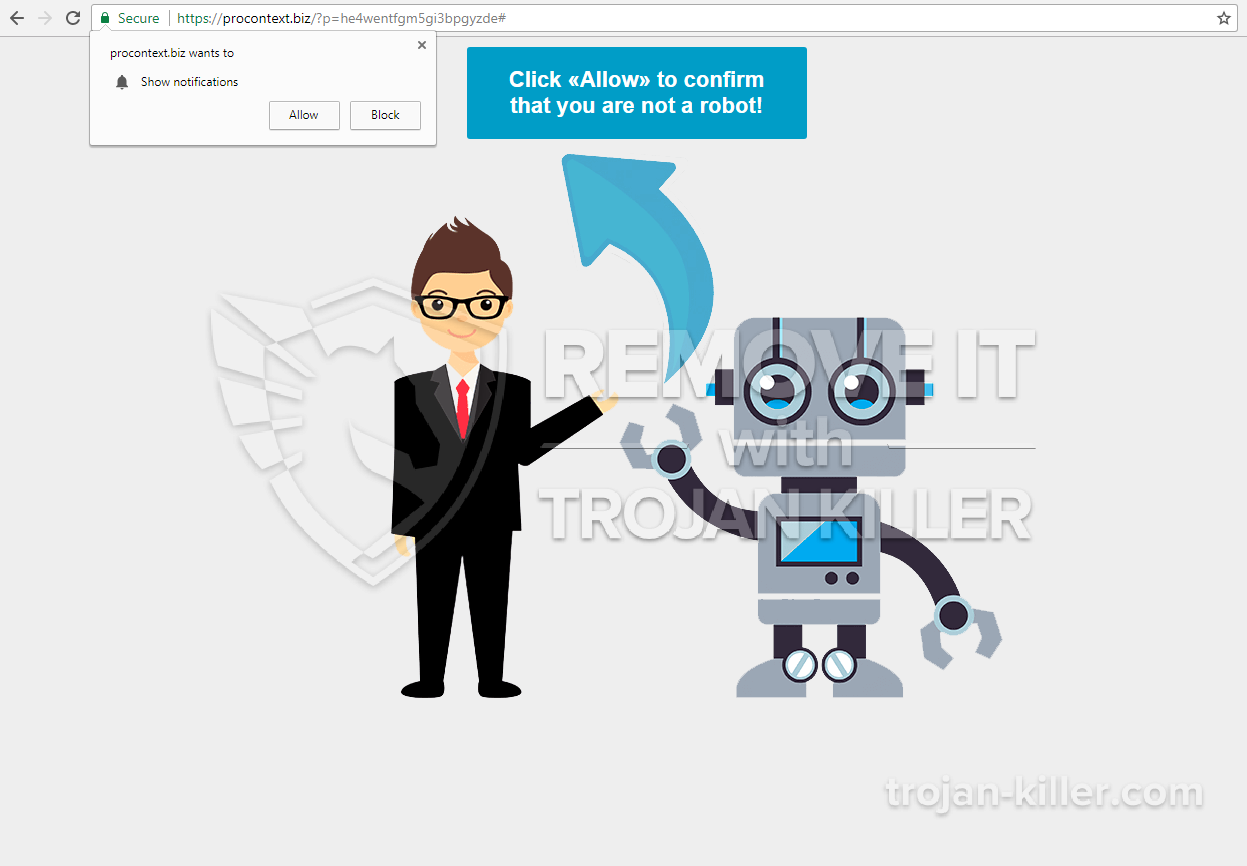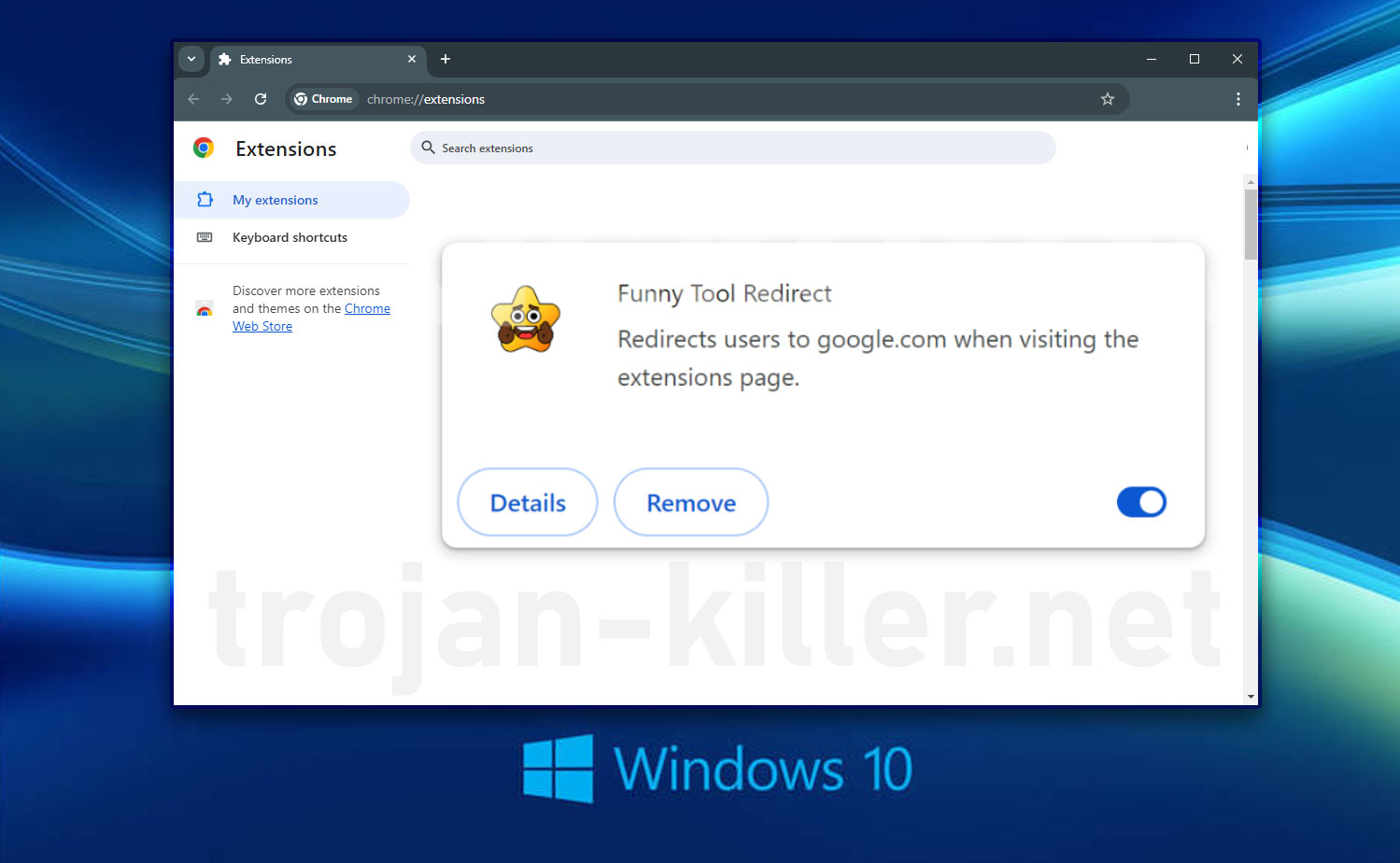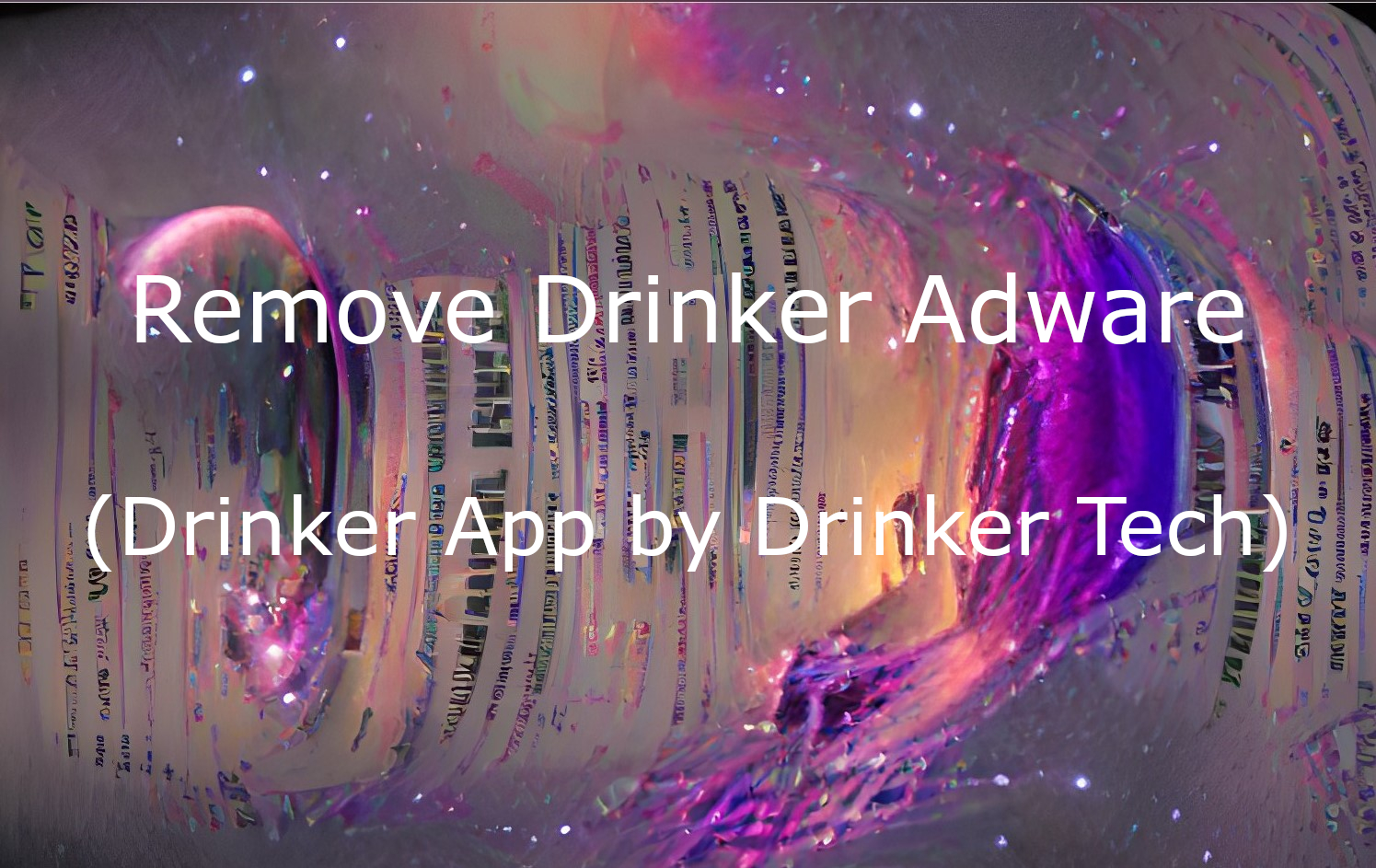How to remove Procontext.biz Pop-up Ads


The Procontext.biz notifications are a social engineering attack that tries to fool you into subscribing to its push notifications so that they can send unwanted ads directly to your desktop.
The Procontext.biz website will push a “Confirm notifications” pup-up, asking you to subscribe to alerts from this resource. If you click the “Allow” , then you will begin seeing unwanted pop-up window from Procontext.biz on your desktop even when your web browser is not visible.
The Procontext.biz site will display the following window
:
Procontext.biz wants to Show notifications Please Press Allow to Continue Watch!
You should not click on the “Allow” because the Procontext.biz will spam your web browser with unwanted ads. If you have allowed the Procontext.biz website to send out notifications in your web browser, then you will require to erase these permissions.


These Procontext.biz pop-up are caused either by annoying advertisements on the sites you go to or adware. This guide was written to assist Windows users get rid of malware from your system.
When it comes to adware, these destructive programs are bundled with other free software application that you download from the Internet. Unfortunately, some complimentary downloads do not adequately reveal that other software application will also be set up and you might discover that you have actually set up adware without your understanding. When a destructive program is installed, whenever you will browse the Internet, undesirable ads from Procontext.biz will show windows.
Procontext.biz is getting on the nerves of many users, so you’re not its only victim.
People ask how to fix the problem effectively. Getting rid of the infection manually may be a long-lasting undertaking and can damage other important system files. Scan your PC with GridinSoft Anti-Malware to detect and delete Procontext.biz in the right way.
GridinSoft Anti-Malware Review, How to get free trial?, EULA, and Privacy Policy.
Here are a couple of typical signs that you have adware on your system:
- Your web internet browser’s homepage has inexplicably changed without your authorization.
- Advertisements appear in locations they shouldn’t be.
- Website links redirect to sites various from what you anticipated.
- Sites that you typically visit are not displaying appropriately.
- Your favorite browser (Chrome, Firefox or Opera) notifications appear which suggest phony updates or other services.
- Some other undesirable programs might get set up without your permission.
Follow the steps in the slider explaining how to use GridinSoft Anti-Malware.
- Step 1. Download GridinSoft Anti-Malware. Click on its installer in the left-bottom section of your browser.
- Step 2. Allow changes to be made via User Account Control.
- Step 3. Click on “Install” to install the program.
- Step 4. Wait until the program is fully installed into your PC.
- Step 5. Click on “Finish“.
- Step 6. Run the program. Wait until scanning is completed and all malware linked with “Procontext.biz” is detected.
- Step 7. Click on “Clean Now” for remove Procontext.biz.
- Step 8. Select the license type and purchase the program. Remove all identified threats with purchased version of the software.
- Step 9. Shut down all your browsers. In GridinSoft Anti-Malware, click on “Tools“, then select “Reset browsers settings” option.
- Step 10. Select browsers you want to be automatically reset and appropriate reset options, then click on “Reset“.
- Step 11. Click on “Protect“. Make sure that Internet Security mode is enabled.
Tips to remove Procontext.biz manually from your PC.
STEP 1. Uninstalling unwanted software regularly (via the Control Panel).
In order to get rid of Procontext.biz from your system, locate the “Uninstall a program” feature in your PC depending on the version of your Windows operating system:
- For Windows 8/10: Right-click on Start – Quick Access Menu – Control Panel – Uninstall a program. You may check the list of applications and utilities installed on your PC. Find suspicious software that may cause Procontext.biz problem, then right-click on it and select “Uninstall“.
- For Windows 7: Click on Start – Control Panel – Uninstall a program. Check the list of programs and software available in your PC that might cause Procontext.biz problem, then press “Uninstall“.
- For Windows XP: Click on Start – Control Panel – Add/Remove Programs. You will find the list of available programs in your PC. Right-click on suspicious software that may cause Procontext.biz problem and select “Uninstall“.
Here is the detailed process with screenshots on how to uninstall unwanted software manually.
- Right-click on Windows logo in the bottom-left section of the screen, then select “Control Panel“:
- In “Programs” section, click on “Uninstall a program“:
- Right-click on specific unwanted application, the select “Uninstall“:
- Right-click on Windows taskbar, then select “Task Manager“:
- Select specific task related to unwanted program, then right-click on it and choose the option “End Task“:
Warning! Some unwanted programs may be active (running) while you attempt to uninstall them. It might be necessary for you to end their task via the Task Manager application. Here is how you can do that:
Warning! Manual malware removal as described above is often a very time-consuming undertaking. It requires a lot of technical skills and does not guarantee absolute repair of your system. We recommend you to select our fully automatic solution to fix your PC on a professional basis.
STEP 2. Fixing your browser home page and search engine settings.
Instructions to fix Google Chrome home page and search engine settings manually.
- Click on Google Chrome menu in the form of three vertical dots, then select “Settings“:
- Scroll down through Google Chrome Settings until you reach “On Startup” section. Select “Open a specific page or set pages“. Find suspicious unwanted home page, then clock on “Remove“:
- In Google Chrome Settings find “Search Engine” section. Select your preferred search engine to be enabled if your search settings are messed up (amended) by adware or browser hijacker:
- Click on “Manage search engines“.
- Find specific search engine that you do not want to be your default one, then click on “Remove from list“:
Instructions to restore Mozilla Firefox home page and search engine settings manually.
- In Mozilla Firefox, click on its menu in the form of three horizontal lines, then select “Options“:
- In “General” section, check home page settings. Remove unwanted parameters, or click on “Restore to Default“:
- In the “Search” section of Mozilla Firefox, select your preferred search engine:
- You may as well remove unwanted search engine completely from Mozilla Firefox by clicking on the “Remove” button next to it:
Instructions to repair Internet Explorer home page and search engine settings manually.
- In Internet Explorer, click on its settings menu in the form of a gear-wheel, then select “Internet Options“:
- Click on the “General” tab, then check home page settings. Remove unwanted home page from the field, or click on “Use new tab“. Click on “Apply” to save changes:
- In Internet Explorer, click on its settings menu in the form of a gear-wheel, then select “Manage add-ons“:
- Click on “Search Providers“, then select unwanted search engine and click on “Remove” button related to it:
Instructions to change Opera home page and search engine settings manually.
- Click on Opera menu in the form of “Opera” button, then select “Settings“:
- Click on “Browser” section, then select “Set pages“:
- Find unwanted start page of Opera, then click on “X” next to it to remove it:
- In the “Search” section, click on “Manage search engines…“:
- Click on “Make default” to select your preferred default search engine, then click on “Done“:
STEP 3. Removing unwanted extensions from browsers.
Deleting unwanted extensions from Google Chrome.
- Click on Google Chrome menu in the form of three vertical dots, then select “Settings“:
- Click on “Settings” in the left menu (in the form of three horizontal lines), then select “Extensions“:
Google Chrome extensions - Find unwanted extension, then click on “Remove” button next to it:
Removing unwanted add-ons from Mozilla Firefox.
- In Mozilla Firefox, click on its menu in the form of three horizontal lines, then select “Add-ons“:
- Click on the “Extensions” item. If you see suspicious add-ons, disable and then delete them:
Getting rid of unwanted addons from Internet Explorer.
- In Internet Explorer, click on its settings menu in the form of a gear-wheel, then select “Manage add-ons“:
- In the section called “Toolbars and Extensions“, find specific unwanted add-on, then click on “Disable” button related to it:
Cleaning unwanted extensions from Opera.
- Click on Opera menu in the form of “Opera” button, then select “Extensions“:
- Find specific unwanted extension, then click on “Disable” button associated with it:
STEP 4. Disabling push notifications from browsers.
Disabling push notifications from Google Chrome.
- Click on Google Chrome menu in the form of three vertical dots, then select “Settings“:
- Scroll down to the bottom of the page, then click on “Advanced“:
- In “Privacy and Security” section, click on “Content Settings“:
- Click on “Notifications“:
- Find specific site that is displaying unwanted push notifications, click on its options in the form of three vertical dots, then click on “Remove“:
Disabling push notifications from Mozilla Firefox.
- In Mozilla Firefox, click on its menu in the form of three horizontal lines, then select “Options“:
- Scroll down to “Privacy & Security” section, then find “Notifications“, click on “Settings” button related to it:
- Find unwanted sites that keep displaying unwanted notifications, then change the status from “Allow” to “Block“. Additionally, check the box “Block new requests asking to allow notifications“. Then click on “Save changes“:
STEP 5. Full reset of browsers either manually or automatically (video guides).
Important notice! Trying to fix your browsers manually after malware attack is definitely not easy, requires more skills and time, even with detailed description as above. We recommend you to try our absolutely free feature provided by GridinSoft Anti-Malware to reset your browsers automatically within just a couple of mouse clicks!
Recent Posts
Remove Monna2.top Pop-up Ads
About Monna2.top Monna2.top pop-ups can not introduce out of the blue. If you have clicked…
Remove Hotbtubeco.cc Pop-up Ads
About Hotbtubeco.cc Hotbtubeco.cc pop-ups can not launch out of nowhere. If you have clicked on…
Remove Hotbkuyiwo.cc Pop-up Ads
About Hotbkuyiwo.cc Hotbkuyiwo.cc pop-ups can not introduce out of the blue. If you have clicked…
Remove Tnmc6xr71o.sbs Pop-up Ads
About Tnmc6xr71o.sbs Tnmc6xr71o.sbs pop-ups can not open out of nowhere. If you have actually clicked…
Remove Cotorctanputes.co.in Pop-up Ads
About Cotorctanputes.co.in Cotorctanputes.co.in pop-ups can not introduce out of the blue. If you have actually…
Remove Mightytechy.com Pop-up Ads
About Mightytechy.com Mightytechy.com pop-ups can not expose out of the blue. If you have actually…

